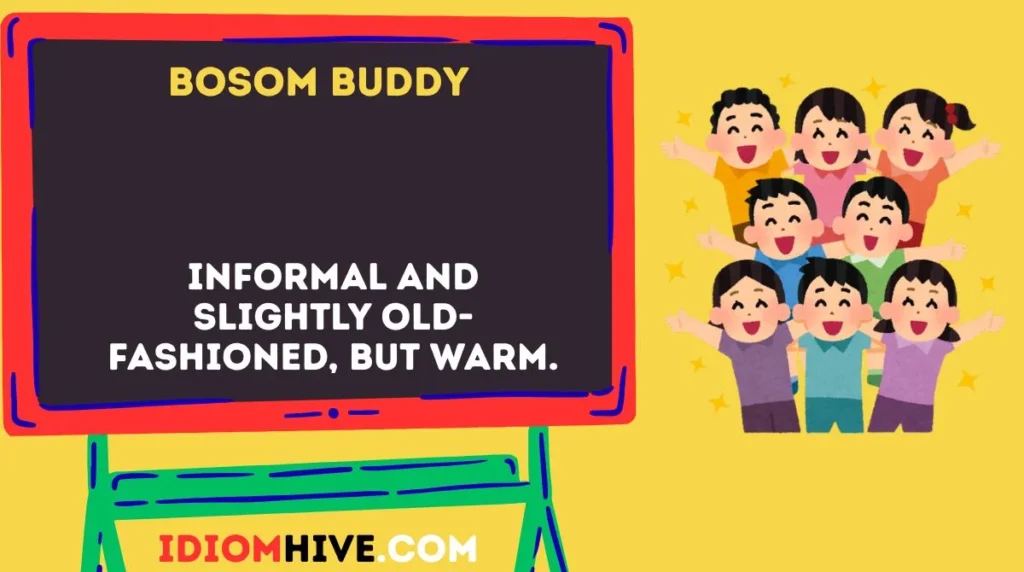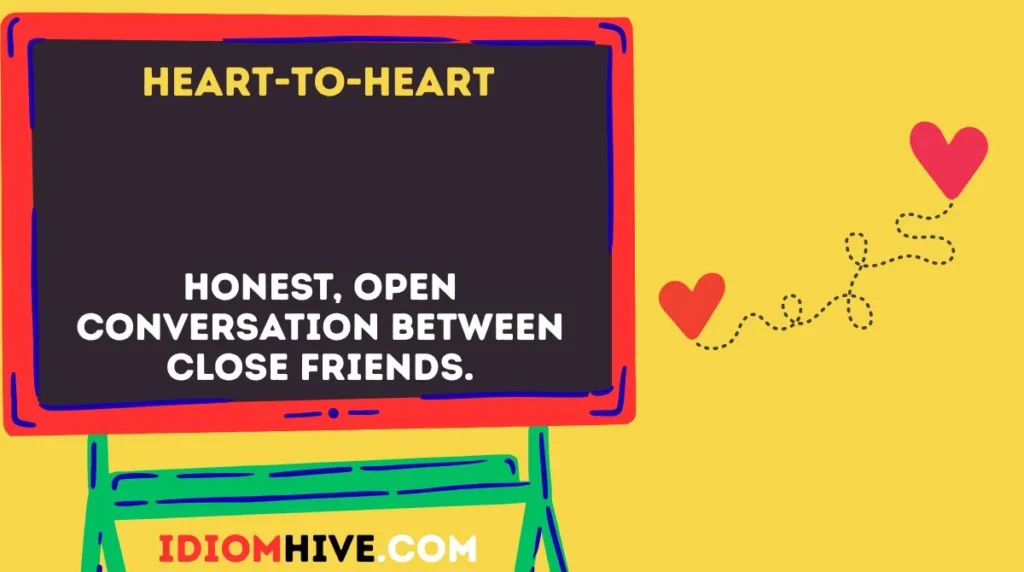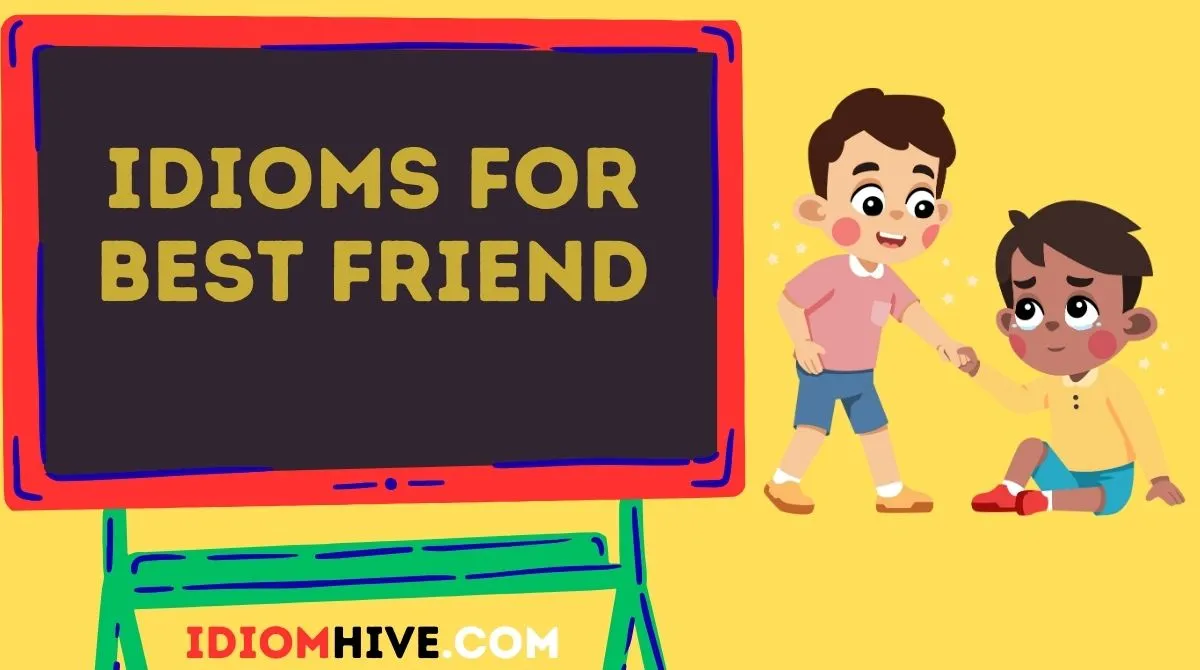Friendship is one of the most valued bonds in life, and language reflects that beautifully. Idioms are special expressions whose meanings go beyond the literal words.
They add color, personality, and emotion to everyday conversations. Instead of saying “we are very close,” you might say “we are like two peas in a pod.” That’s the magic of idioms—they paint a stronger picture of emotions and relationships.
When it comes to best friends, idioms are especially powerful. They capture loyalty, shared laughter, support in hard times, and the fun quirks that make friendships unforgettable.
Using idioms for best friends makes your English sound more natural and heartfelt, whether you’re writing a note, chatting casually, or giving a speech.
So, let’s explore some of the most popular idioms about best friends, grouped into themes like closeness, trust, fun, and support.
Did You Know?
The phrase “thick as thieves” has been used since the 1700s to describe very close friends. Thieves had to trust each other completely to survive, so this idiom became a symbol of deep trust and strong friendship.
Idioms Showing Closeness in Friendship
Two Peas in a Pod
Meaning: Two people who are very similar and always together.
Example: We’re like two peas in a pod; we even finish each other’s sentences.
Alternative: “Like twins”
Note: Commonly used in daily conversations to describe inseparable friends.
Joined at the Hip
Meaning: Always together, never apart.
Example: Since childhood, they’ve been joined at the hip.
Alternative: “Always side by side”
Note: Informal and used to describe deep closeness.
Birds of a Feather
Meaning: People with similar interests stick together.
Example: Birds of a feather flock together, and that’s why my best friend and I get along so well.
Alternative: “Kindred spirits”
Note: Often used when two people naturally get along.
Thick as Thieves
Meaning: Very close friends who trust each other.
Example: She and I are thick as thieves; nothing can come between us.
Alternative: “Bosom buddies”
Note: Often used in casual speech.
Inseparable
Meaning: Cannot be separated because of strong friendship.
Example: Those two are inseparable, always hanging out.
Alternative: “Bound together”
Note: Neutral, can be used in both casual and formal contexts.
Kindred Spirit
Meaning: Someone who shares the same outlook or feelings.
Example: I knew she was a kindred spirit from the moment we met.
Alternative: “Soulmate friend”
Note: Often used in deeper, emotional contexts.
Bosom Buddy

Meaning: A very close and trusted friend.
Example: We’ve been bosom buddies since high school.
Alternative: “Best pal”
Note: Informal and slightly old-fashioned, but warm.
A Friend for Life
Meaning: A permanent, long-term friend.
Example: I know he’s a friend for life because he’s always been there for me.
Alternative: “Lifelong companion”
Note: Often used in heartfelt reflections.
Idioms Expressing Trust and Loyalty
Through Thick and Thin
Meaning: Staying loyal in both good and bad times.
Example: She has stood by me through thick and thin.
Alternative: “Come rain or shine”
Note: Common in sincere conversations.
Shoulder to Lean On
Meaning: A supportive friend during hard times.
Example: When I was sad, he gave me a shoulder to lean on.
Alternative: “Support system”
Note: Used in emotional, supportive contexts.
Fair-Weather Friend
Meaning: Someone who is only around during good times (negative).
Example: I realized she was a fair-weather friend when she left me during tough times.
Alternative: “Opportunistic friend”
Note: Warning phrase, often negative.
Salt of the Earth
Meaning: A very good, dependable person.
Example: My best friend is the salt of the earth—kind and honest.
Alternative: “Solid as a rock”
Note: More formal, often in praise.
Stand by Someone
Meaning: To stay loyal and supportive.
Example: He always stands by me no matter what.
Alternative: “Stick with someone”
Note: Common in everyday speech.
Stick Together
Meaning: To stay united and not leave each other.
Example: We promised to stick together no matter what happens.
Alternative: “Stay close”
Note: Informal, used among friends and family.
Ride or Die
Meaning: A best friend who is with you in every situation.
Example: She’s my ride or die—we’ve been through everything together.
Alternative: “True companion”
Note: Very informal, modern slang.
Have Someone’s Back
Meaning: To protect and defend your friend.
Example: Don’t worry, I’ve got your back.
Alternative: “Look out for someone”
Note: Popular in casual English, especially among young people.
Idioms About Fun and Shared Experiences
Partner in Crime
Meaning: A friend you share adventures (or mischief) with.
Example: She’s my partner in crime whenever we plan surprises.
Alternative: “Adventure buddy”
Note: Informal, playful.
Laughing Stock (Together)
Meaning: To laugh so much you don’t care if people stare.
Example: We became the laughing stock of the party but had fun anyway.
Alternative: “Burst out laughing together”
Note: Casual, humorous.
Barrel of Laughs
Meaning: Someone who is always fun to be around.
Example: My best friend is a barrel of laughs.
Alternative: “Life of the party”
Note: Informal, joyful.
Inside Joke
Meaning: A joke understood only by close friends.
Example: We have so many inside jokes that others don’t get.
Alternative: “Private joke”
Note: Very common in casual friendships.
Join the Club
Meaning: Shared experience or situation among friends.
Example: You lost your phone? Join the club—we all have!
Alternative: “Same boat”
Note: Informal, often humorous.
Make Someone’s Day
Meaning: To make your friend feel very happy.
Example: Her surprise call really made my day.
Alternative: “Brighten someone’s day”
Note: Used in friendly and casual contexts.
Thick and Fast (Stories/Laughter)
Meaning: Coming quickly and in large amounts.
Example: The jokes came thick and fast when we met after years.
Alternative: “Endless fun”
Note: Lighthearted expression.
Get Along Like a House on Fire
Meaning: To quickly become very good friends.
Example: We got along like a house on fire from the first meeting.
Alternative: “Hit it off”
Note: Informal, common in daily speech.
Idioms About Support and Understanding
Lend an Ear
Meaning: To listen carefully and with empathy.
Example: She always lends an ear when I need to talk.
Alternative: “Be a good listener”
Note: Used in caring situations.
Heart-to-Heart

Meaning: Honest, open conversation between close friends.
Example: We had a heart-to-heart about our future.
Alternative: “Deep talk”
Note: Informal but emotional.
Old Faithful
Meaning: A friend who is always reliable.
Example: She’s my old faithful—always there, always steady.
Alternative: “Dependable friend”
Note: Warm and friendly tone.
Shoulder to Cry On
Meaning: A friend who comforts you in sadness.
Example: He was a shoulder to cry on after my breakup.
Alternative: “Comforting presence”
Note: Emotional, supportive expression.
Pick Someone Up
Meaning: To cheer up a friend when they feel low.
Example: She picked me up when I was feeling down.
Alternative: “Lift someone’s spirits”
Note: Common in supportive friendships.
True Colors
Meaning: Showing real character, especially in tough times.
Example: My best friend showed her true colors when she supported me during hardship.
Alternative: “Reveal character”
Note: Can be positive or negative.
A Tower of Strength
Meaning: A very strong and supportive friend.
Example: She was a tower of strength during my illness.
Alternative: “Rock of support”
Note: Formal and emotional.
Go the Extra Mile
Meaning: To do more than expected for a friend.
Example: He went the extra mile to help me move.
Alternative: “Above and beyond”
Note: Neutral, common in both formal and casual talk.
How to Use These Idioms in Daily Life
- Speaking: Use idioms in casual chats to express friendship in a lively way. Saying “We’re joined at the hip” sounds warmer than just saying “We’re close.”
- Writing: Idioms make notes, cards, or social media posts heartfelt. For example: “Happy Birthday to my partner in crime!”
- Professional Usage: Even in speeches, presentations, or team-building, idioms like “through thick and thin” can highlight loyalty and trust.
Common Mistakes Learners Make With Idioms
- Using idioms literally
❌ We are peas in a pod, we always sit inside a pod.
✅ We are like two peas in a pod because we’re inseparable. - Mixing idioms incorrectly
❌ He’s my tower of laughter.
✅ He’s a tower of strength / a barrel of laughs. - Overusing idioms in one sentence
❌ She’s my partner in crime, thick as thieves, joined at the hip, inseparable.
✅ She’s my partner in crime—we’re inseparable.
FAQs
1. Why are idioms for best friends important?
They help you express emotions more vividly and make your English sound natural.
2. Are these idioms formal or informal?
Most are informal, but some like tower of strength and salt of the earth can be used in formal contexts.
3. Can I use these idioms in writing?
Yes! They work well in letters, messages, cards, and even professional speeches if used correctly.
4. What’s the difference between “partner in crime” and “ride or die”?
“Partner in crime” is playful and about fun, while “ride or die” shows deep loyalty in every situation.
5. How can I remember idioms easily?
Connect them to personal experiences with your own best friend. That makes them stick in memory.
Conclusion
Idioms for best friends capture the heart of true friendship—closeness, loyalty, fun, and support. They turn simple words into vivid pictures and show emotions more deeply.
By learning and using these idioms, you can make your English not only correct but also warm and expressive. Whether in casual talks, heartfelt messages, or even speeches, these expressions will help you celebrate the beauty of friendship.
So the next time you talk about your best friend, don’t just say “we’re close”—say you’re “thick as thieves” or “joined at the hip.” It will bring your words to life!










